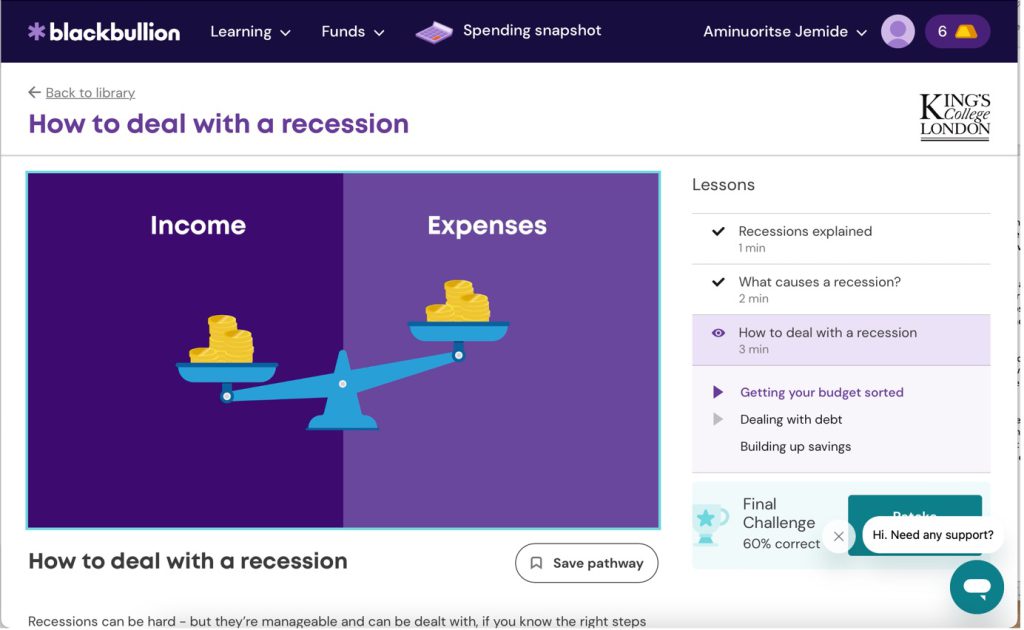Do you have any questions about money management during your time at university? Would you like to speak to another student about your budgeting concerns? If so, the Money Mentors are here for you! We are current trained students at King’s with a particular interest in being money savvy, and we hope to support our fellow students with all sorts of money-related matters. If you’re unsure of how to create a realistic budget, would like to explore various ways of saving money, and keep yourself safe from scams throughout the year, our Student Money Mentors would always be happy to support you. We will introduce our Money Mentor team below, which consists of students from different backgrounds and courses.
Tasniya Aktar
Hi, I’m Tasniya and I’m a fourth-year medical student. Being a Money Mentor is great as it means I get to help students manage their money better, which then leads to them having a better student experience! I’m really looking forward to meeting new students in the upcoming year and creating online content through blogs and social media posts.

Aanchal Raina
Hi, I’m Aanchal and I’m a fourth-year medical student. I joined the team two years ago, and I’m really excited for the upcoming year, where I can meet new students and hopefully pass on some money-saving tips and general advice about settling in. I am currently leading the Blog Team and I look forward to creating new content this year!

Ilinca Olteanu
Hi guys! I’m Ilinca, a postgraduate Public Policy and Management student and I have been a Money Mentor since February 2022. I joined the team to increase my financial awareness, as well as to help fellow students looking for guidance. I am the Head of the Social Media Team, and I actively manage our social media platforms and create content. I can’t wait to see what the upcoming year at King’s brings us!

Amber Naeem
Hi, my name is Amber and I’m currently a fourth-year medical student. I joined the Money Mentors team two years ago and in that time I’ve been able to interact with new students, help organise in-person campaigns, create fun social media posts and share financial guidance with peers. More recently, I’ve become a permanent member of the social media team which I hope to promote even more throughout the next year!

Ami Jemide
My name is Ami and I’m a final year law student. I’ve been a money mentor for two years. The best part of this role – and the main reason I applied for it – is being able to learn more about money management while teaching it to my peers. It’s a mutually beneficial relationship really! I’m looking forward to the ‘big events’ like National Student Money Week and Welcome Week.

Tom Appleby
Hi, my name is Tom and I’m currently a second-year Philosophy, Politics and Economics student. I became a Money Mentor not only to receive some income whilst taking my degree, but also to learn more about money matters and help other students with any problems related to money, as this is such a vital part of student life. I am looking forward to meeting new people and helping other students to feel more secure in their financial knowledge, which will help them make the most of their time at King’s.

Sam Landells
Hi I’m Sam, and I’m entering my 3rd year of the graduate entry medicine programme! The reason I became a money mentor was because I wanted to share what I’ve learnt about managing a student budget over my 5 years (and counting) at uni. I’m most looking forward to our National Student Money Week, where we run events every day, with lots of fun stalls and interesting people to meet!

Amaliia Popova
Hello! My name is Amaliia and I am a second-year BA International Relations student! This is my second year as a Money Mentor and I am very excited to be a part of such a driven team and help improve our community’s financial awareness.

Afra Alam Haque
Hi, my name is Afra and I’m a third-year medical student. Coming into university, money was always one of my biggest concerns. I was entering a new stage of my life where I needed to manage my money carefully and responsibly. This led to a journey of learning about budgeting, saving and spending responsibly by getting the best deals and discounts around London. I joined the money mentors to help other students build more confidence about managing their money whilst also encouraging everyone to have a positive experience at university without breaking the bank!

Evlyn Joseph
Greetings! I’m Evlyn, a postgraduate student studying International Relations. I became interested in the King’s Money Mentors even before coming to King’s, because of their online presence and how they helped me during my preparation to study abroad. I was also impressed by the impact the team created when I interacted with them during Welcome week. I am thrilled to be a Money Mentor because I have the opportunity to navigate students in the direction of financial awareness and also learn from them. I am looking forward to being a part of this cohort and to conduct fun activities during the campaigns this year.

Hope Jeffcoat
Hi, I’m Hope and I’m a second-year Geography student. I took on this role not only to understand more about budgeting and saving money, but to help other students develop healthier relationships with money at university. Next year, I am looking forward to taking on more responsibilities, especially in the BlackBullion Team. I’m hoping that more students will be able to interact with Blackbullion in the upcoming year, and I’m looking forward to developing my design skills and working with my amazing colleagues.

Duaa Ali Faruqi
Hi, my name is Duaa and I’m a final-year medical student. I am really interested in learning about managing money myself and also helping other students take control of their finances. I’m looking forward to learning more about finances and building on my knowledge. I’m excited to share my experience and knowledge to support other students too.

Claire Han
Hi, I’m Claire and I’m a third-year medical student. Having lived in seven different countries, I’ve learned the importance of smart money management and how to adapt to various financial situations. My goal is to make a positive impact on fellow students’ lives, whether this is through a friendly chat or by sharing practical tips on saving and growing money!

Where can students speak to or connect with the Money Mentors?
Students can reach out to Money Mentors on Instagram and ask any money-related questions they may have! You can also take a look at our Money Mentors blog for some tips on managing your money and staying (financially) safe during your time at university. However, if you need specialist advice tailored to any complex financial situation or have serious concerns that require urgent help, please contact the Money & Housing Advice Service where you can speak to a Specialist Money & Housing Adviser.
Whether you’re interested in speaking to another Money Mentor or are hoping to become a Money Mentor yourself, we hope this blog post gives you a better idea of who we are and what we do alongside our specialist advisers. Student Servies also has a page on Money Mentors, should you be interested in learning more about us! Finally, if you have any concerns about financial wellbeing or wish to know more about what we do, again, please do not hesitate to contact us on Instagram!
King’s Student Money Mentors
Part of Money & Housing Advice
The King’s Student Money Mentors blog shares our students’ personal experiences and thoughts on money-related topics. Any reference, opinions or recommendations on a particular company/brand are only the views of the student(s) who wrote the blog post. King’s College London, the Money & Housing Advice service and the Money Mentor project do not share the views in the blogs nor endorse any of the companies mentioned. Readers should conduct their own research before using any companies mentioned in our blog posts.



